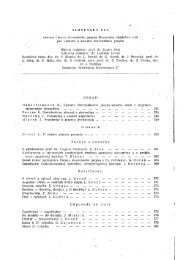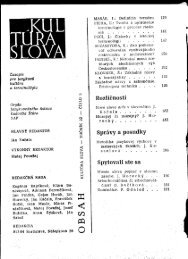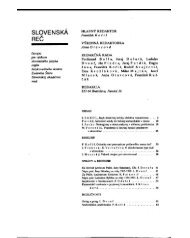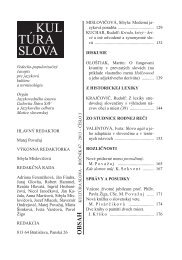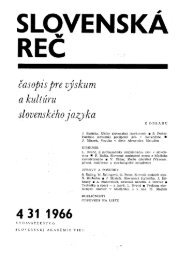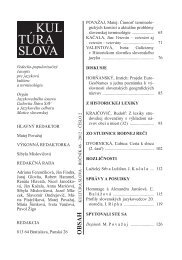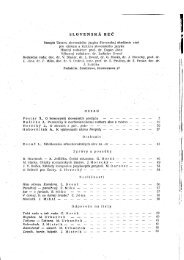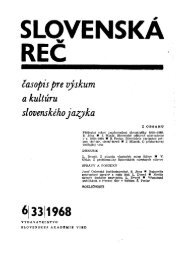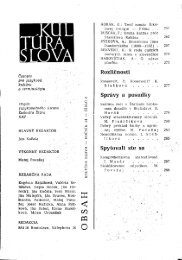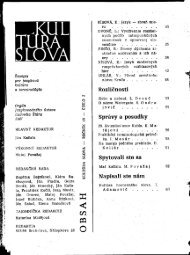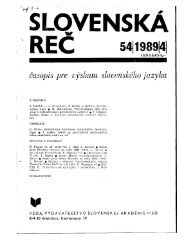- Page 1 and 2:
VARIA XVI Bratislava Slovenská jaz
- Page 3 and 4:
Slovenská jazykovedná spoločnos
- Page 5 and 6:
Skolokvijnieva sa. Vždy na jeseň,
- Page 7 and 8: Obsah Slovo na úvod...............
- Page 9: Oľga Orgoňová: Lingvokultúrna k
- Page 12 and 13: právania o prednesených témach a
- Page 15 and 16: Dispozičné podoby frazém Dana Ba
- Page 17 and 18: 1,59 - zaplatiť niečo /svojou/ hl
- Page 19 and 20: nachádzajú svoje uplatnenie pomen
- Page 21 and 22: Úradné mená sú spoločensky kod
- Page 23 and 24: V skúmaných siedmich obciach sa z
- Page 25 and 26: ilingvizmus je prítomný aj v pou
- Page 27 and 28: v súčasnom školskom systéme pod
- Page 29 and 30: Literatúra BLANÁR, Vincent.: Medz
- Page 31 and 32: mätateľné a sprostredkujú infor
- Page 33 and 34: ňovania. Ak sa napríklad využív
- Page 35 and 36: (tenora), a to na základe podobnos
- Page 37 and 38: ukážka č. 1 ukážka č. 2 37
- Page 39 and 40: ukážka č. 5 ukážka č. 6 39
- Page 41 and 42: ukážka č. 9 ukážka č. 10 uká
- Page 43 and 44: Analógia ako princíp jazyka a ako
- Page 45 and 46: Tu sa otvára analogický vzťah s
- Page 47 and 48: koncovka -mi (poet-ami / poet-mi) v
- Page 49 and 50: Literatúra Beľanin, Valerij, P.:
- Page 51 and 52: ných, navíc vydaných v krátkém
- Page 53 and 54: hřivnu, bratru Janovi s Václavem
- Page 55 and 56: mocné poručníky a správce uroze
- Page 57: Writer Vocabularies of Ukrainian Au
- Page 61 and 62: 3.4. The frequency dictionary chara
- Page 63 and 64: БУК, Соломія - РОВЕН
- Page 65 and 66: naopak méně výrazným symbolick
- Page 67 and 68: Výsledkom preto zostáva neraz zlo
- Page 69 and 70: Literatúra Primárna: JOHANIDES, J
- Page 71 and 72: Reklama na Kofolu má dodatek: Šť
- Page 73 and 74: Mnohé reklamy zapojují do svých
- Page 75 and 76: Podobně využívá hry se slovy i
- Page 77 and 78: obku. Autor reklamy na prodejnu aut
- Page 79 and 80: Doteraz najstarším známym urbano
- Page 81 and 82: tia do nej ústila Hronská ulica.
- Page 83 and 84: Po vzniku Československa v októbr
- Page 85 and 86: Ďalšie zmeny názvov zvolenských
- Page 87 and 88: Kondicionál ako príznakový člen
- Page 89: Potenciálne vzorce jednotlivých t
- Page 92 and 93: Napriek už spomínanej diskutabiln
- Page 94 and 95: II.3B Ako Židovka vtedy nijako net
- Page 96 and 97: sme poňali z pohľadu úzu a normy
- Page 98 and 99: 1. Indexy prerušenia Prerušenia (
- Page 100 and 101: Závery výpovedí sa v anglickom,
- Page 102 and 103: BAUMANN, Stefan - GRICE, Martine -
- Page 104 and 105: Okrem osobného priznania, že je B
- Page 106 and 107: nicu blízkych slovanských národo
- Page 108 and 109:
objavené nie sú preštudované, v
- Page 110 and 111:
však prehlbuje jeho záujem o fono
- Page 112 and 113:
ce. Vyzdvihuje prvenstvo a jedineč
- Page 114 and 115:
syntax, lexikológiu a lexikografiu
- Page 116 and 117:
III H 8. V posledně jmenovaném ru
- Page 118 and 119:
řidla, tak také Stvořitel vsypal
- Page 120 and 121:
‚přišívat, přidávat nenále
- Page 122 and 123:
Využitie knižnice Jbowl pri sprac
- Page 124 and 125:
klientov. TME časť môže byť im
- Page 126 and 127:
Pre klasifikačné a zhlukovacie al
- Page 128 and 129:
ich textov. Na rozdiel od kategoriz
- Page 130 and 131:
Projekt vyvíjaný v rámci 6. rám
- Page 132 and 133:
severovýchodnej Bukoviny. Sú to m
- Page 134 and 135:
Podľa výsledkov dotazníkového v
- Page 136 and 137:
Následnosť a počet fáz, ktoré
- Page 138 and 139:
Ešte aj dnes dominuje v radoch sta
- Page 140 and 141:
Grosjean, F.: Life with Two Languag
- Page 142 and 143:
tí spracovania niektorých syntagi
- Page 144 and 145:
syntaxi za pomocným slovesom a hod
- Page 146 and 147:
V ilustračnom príklade priamej re
- Page 148 and 149:
Príloha Zoznam funktorov používa
- Page 150 and 151:
Pri realizácii výskumu sme použi
- Page 152 and 153:
A: vyhrala som ≥ aj tichú sedmi
- Page 154 and 155:
Preklad medzi velmi blízkimi náre
- Page 156 and 157:
lexikálni preklad u‘grék‘ : u
- Page 158 and 159:
v jednotnom počtˇe (príveska -uo
- Page 160 and 161:
Vzťah posesivity sa chápe rôzne:
- Page 162 and 163:
mi bez jeho zmeny, prípadne s viac
- Page 164 and 165:
mina - držal si klobúk /držal si
- Page 166 and 167:
Problematika posesívnosti sa teda
- Page 168 and 169:
prispôsobovaním cudzích miestnyc
- Page 170 and 171:
„Ale odpor, ktorý som cítila po
- Page 172 and 173:
v slovenčine funguje ako cudzí pr
- Page 174 and 175:
GENITÍV: „Poloha: novopostavený
- Page 176 and 177:
„Trajektom, ktorý jazdí zo Spli
- Page 178 and 179:
preto je aj z tohto aspektu potrebn
- Page 180 and 181:
V druhej úlohe až 97% žiakov spr
- Page 182 and 183:
Vytvorenie akejkoľvek učebnice ta
- Page 184 and 185:
nebude zavádzajúca ale, podľa m
- Page 186 and 187:
a aplikatívnych cvičení v preva
- Page 188 and 189:
ilustrácií a farebnosti oproti u
- Page 190 and 191:
sa je zvýšiť medzikultúrnu tole
- Page 192 and 193:
Pomáhať študentom chápať a rea
- Page 194 and 195:
Narácia je aktivitou jazyka, a pre
- Page 196 and 197:
„Večer ešte aj jedľové smolie
- Page 198 and 199:
ovania sa stáva prirovnanie. Pri p
- Page 200 and 201:
táto skutočnosť ovplyvňuje pome
- Page 202 and 203:
potok, Mravčí potok, Vlčí potok
- Page 204 and 205:
motivantom, hydronymá motivované
- Page 206 and 207:
Literatúra KRŠKO, Jaromír: Hydro
- Page 208 and 209:
lingvistické s metódami a prístu
- Page 210 and 211:
4. Kategória kultúry Centrálnym
- Page 212 and 213:
atúra, osveta, výchova a v neposl
- Page 214 and 215:
MEŽUJEV, Vadim, M.: Kultúra a dej
- Page 216 and 217:
a Kubriakovovej vnútornej syntaxe)
- Page 218 and 219:
2.1. Pri neodvodených, nemotivovan
- Page 220 and 221:
motivátu. Podľa J. Furdíka (2004
- Page 222 and 223:
koreňových morfém (Sokolová a k
- Page 224 and 225:
HORECKÝ, Ján - BUZÁSSYOVÁ, Klá
- Page 226 and 227:
i. ikóny prvního řádu, což by
- Page 228 and 229:
dřují nejexplicitněji, jsou nej
- Page 230 and 231:
nách ženatých mužov, vydatých
- Page 232 and 233:
a individuálnej charakteristiky vy
- Page 234 and 235:
Obsahové modely (OM) vyjadrujú na
- Page 236 and 237:
Hrnčiarske Zalužany muži ženy s
- Page 238 and 239:
Blanár, Vincent: Problematika výs
- Page 240 and 241:
vlak; вадá, цягнíк); konk
- Page 242 and 243:
стáраста, суддзя, М
- Page 244 and 245:
Bieloruština: I. deklinácia: mask
- Page 246 and 247:
v bieloruštine prípony -ы/ -i (n
- Page 248 and 249:
pl. H. плямёны, P. плям
- Page 250 and 251:
Kilka uwag o języku „Gęśli ró
- Page 252 and 253:
Dwuletni pobyt w Toruniu, poza spra
- Page 254 and 255:
pijćie, swoiej, vpijam) użyty w t
- Page 256 and 257:
Zgodna z panującą w XVI-wiecznych
- Page 258 and 259:
VZ + (- tematická morféma -) + -n
- Page 260 and 261:
7. „robenie, tvorenie toho, čo j
- Page 262 and 263:
ozšíriť 22 rozšírenie 28 rozš
- Page 264 and 265:
Tabuľka 1: Prvé číslo v stĺpci
- Page 266 and 267:
Ich použitie v umeleckých textoch
- Page 268 and 269:
NAVRÁTIL, Ladislav: Tvorenie inšt
- Page 270 and 271:
označiť / pomenovať nový jav al
- Page 272 and 273:
- výberovka (z výberový album) -
- Page 274 and 275:
4. zopakované internacionalizmy, k
- Page 276 and 277:
8. nové lexikalizované spojenia n
- Page 278 and 279:
- globula (lekárske pomenovanie pr
- Page 280 and 281:
OLOŠTIAK, Martin: Abreviačná a s
- Page 282 and 283:
ním a reagovaním danej postavy a
- Page 284 and 285:
obiť, aby mä Pán Boh na dietkach
- Page 286 and 287:
krétnej skupine čitateľov, čo m
- Page 288 and 289:
Lichard, Daniel: Nasse nowé penjze
- Page 290 and 291:
Charakteristika brainstormingu (zhl
- Page 292 and 293:
vlna (na mori) - vlna (ovčia) box
- Page 294 and 295:
U: Porozmýšľajte, či máte na j
- Page 296 and 297:
vávajúcich vo svojom jazykovom sy
- Page 298 and 299:
• pádová prípona -oma 7 // -am
- Page 300 and 301:
nejšie grafické zachytenie náre
- Page 302 and 303:
STIEBER, Zdisłav: Przyczynek do di
- Page 304 and 305:
(objekt sa vyznačuje polyonymiou),
- Page 306 and 307:
ústi. Nielen v rámci tohto druhu
- Page 308 and 309:
Zložitejšími modelmi môžeme vy
- Page 310 and 311:
na jelkuranie (LibLeg 10/97 v). Sł
- Page 312 and 313:
jest ich 114’ (A, 81: őurej, őu
- Page 314 and 315:
czy metaforycznych nazw, typu: dekr
- Page 316 and 317:
Motivácia a štruktúrne typy slov
- Page 318 and 319:
Motiváciou názvov bývajú predme
- Page 320 and 321:
(REŚTAURÁCIA - KOZAR S & S; RESTA
- Page 322 and 323:
) Látkové mená (materiáliá): b
- Page 324 and 325:
druhotný. O analógii by sme mohli
- Page 326 and 327:
Odchýlky v jednotlivých kodifika
- Page 328 and 329:
LETZ, Belo: Genitív jednotného č
- Page 330 and 331:
a/u Pozn. a/u Pozn. hámor 18/6 š
- Page 332 and 333:
a/u Pozn. a/u Pozn. oštep 9/62 žu
- Page 334 and 335:
ju spomenieme len v prípadoch, ke
- Page 336 and 337:
tívne kompaktné osídlenie v obci
- Page 338 and 339:
20 respondentov vo veku od 27 do 83
- Page 340 and 341:
keďže jeho použitie sa javí ako
- Page 342 and 343:
Literatúra Adamec, Přemysl: K ekv
- Page 344 and 345:
Substantivní frazémy v zrcadle Č
- Page 346 and 347:
a) země pruhů a hvězd (0) - zem
- Page 348 and 349:
do tzv. středního frekvenčního
- Page 350 and 351:
Mlacek, Jozef: K internacionalizác
- Page 352 and 353:
Nasleduje niekoľko ukážok s anal
- Page 354 and 355:
„V spolupráci s magistrátom sme
- Page 356 and 357:
ešte k lepšiemu odhadu. V Krčmá
- Page 358 and 359:
S 4) „Najprv sa musia stať sláv
- Page 360 and 361:
Językowy obraz słowianofilskich p
- Page 362 and 363:
Lilicz - złożenia typu čarotajn
- Page 364 and 365:
Základné zásady a pravidlá slov
- Page 366 and 367:
skutočnosti. Prevahou písali a p
- Page 368 and 369:
s- , napr. skaziť, stratiť, schud
- Page 370 and 371:
logického princípu sa neskôr obm
- Page 372 and 373:
Syntaktická cvičení v učebnicí
- Page 374 and 375:
yla nezbytnou součástí učební
- Page 376 and 377:
Konkrétní příklady jednotlivýc
- Page 378 and 379:
Hauser, Přemysl: Didaktika české
- Page 380 and 381:
ażały również pewne cechy kateg
- Page 382 and 383:
lenie się od przedmiotu’. Jego f
- Page 384 and 385:
mają oczywiście różny charakter
- Page 386 and 387:
vedomia cieľových skupín adresá
- Page 388 and 389:
Komplexnejšie reprezentácie rekla
- Page 390 and 391:
ly v prezentácii žien v závislos
- Page 392 and 393:
Intenčný bilingvizmus u detí. Po
- Page 394 and 395:
Analýza jazykovej kompetencie v ne
- Page 396 and 397:
Ďalšou oblasťou, v ktorej boli z
- Page 398 and 399:
modálneho slovesa a slovesného ne
- Page 400 and 401:
v slovenčine nazývaná „starká
- Page 402 and 403:
• sociálno-ekonomické výhody
- Page 404 and 405:
teda bez problémov a správne osvo
- Page 406 and 407:
makroalternácii bolo toto striedan
- Page 408 and 409:
CARRINGER, Dennis C.: Creative Thin
- Page 410 and 411:
(pojęcie aspektu). Postulat ten wy
- Page 412 and 413:
pozostaje jedynie otwarta dla tych
- Page 414 and 415:
Koncepcja semantyczna odrzuca zało
- Page 416 and 417:
słc. -ný, (ohybný, nepodplatný)
- Page 418 and 419:
nedosiahnuteľný, nedostihnuteľn
- Page 420 and 421:
nymi. Kwalifikator dawny, oznaczaj
- Page 422 and 423:
legiend o ňom. Objavili sa preto d
- Page 424 and 425:
ské nárečie s mnohými prvkami s
- Page 426 and 427:
tak mu poslúžim. A ty oznám cár
- Page 428 and 429:
v strede mesta a trhu vyvesiť. A d
- Page 430:
novník tvoj zabil ťa. Ak sám odv
- Page 433 and 434:
zyky, z kterých kánon sestával (
- Page 435 and 436:
Daný spis mohl být mít nejrůzn
- Page 437 and 438:
Zásahy, které se objevují v ruko
- Page 439 and 440:
svaté je pro něj to, co je staré
- Page 441 and 442:
zující teologickou zvěst Písma
- Page 443 and 444:
Biblí česká v Benátkách tišt
- Page 445 and 446:
v Výraz operácia (peňažná, pla
- Page 447 and 448:
1.3. Synekdochické pomenovania V r
- Page 449 and 450:
ktorej sa treba vzdať, aby bolo mo
- Page 451 and 452:
Levická, Jana: Proces ustaľovania
- Page 453 and 454:
Na obrázku č. 1 môžeme vidieť
- Page 455 and 456:
ceho (angl. downstep), zavádza tie
- Page 457 and 458:
uska; 1 http://www.livejournal.com/
- Page 459 and 460:
skytuje - antiortografická zmena (
- Page 461 and 462:
8) Písmeno щ a skupina сч. Pís
- Page 463 and 464:
spája skôr s humorom a recesiou a
- Page 465 and 466:
Obr. 3: Paródia na TV propagáciu
- Page 467 and 468:
Bible Litoměřicko-třeboňská v
- Page 469 and 470:
provést i jejich podrobnější an
- Page 471 and 472:
Totožnost korektorova známá nen
- Page 473 and 474:
dochovaný záznam o historii těch
- Page 475 and 476:
Kým Živý bič sa skladá z dvoch
- Page 477 and 478:
len sám seba, ba ani dedinu. Stáv
- Page 479 and 480:
akteristiky postavy Adama Hlavaja n
- Page 481 and 482:
Racionalita konania Adama Hlavaja s
- Page 483 and 484:
V druhom a treťom type materinský
- Page 485 and 486:
Nový Sad je zvolený preto, lebo j
- Page 487 and 488:
sa používajú. Boli to porekadlá
- Page 489 and 490:
Sociokulturní aspekty při výuce
- Page 491 and 492:
Multikulturní výchova a vzděláv
- Page 493 and 494:
sylabů, směrnic pro vývoj kuriku
- Page 495 and 496:
či Koreje jako rozvojové země).
- Page 497 and 498:
Jediný možný způsob, jak s text
- Page 499 and 500:
potřebám a zájmům žáků a stu
- Page 501 and 502:
mince‘ (viz Machek, 1971, s. 730;
- Page 503 and 504:
lé útočné akce, tedy novodobé
- Page 505 and 506:
Literatura BĚLIČ, Jaromír: Pozn
- Page 507 and 508:
lého století. I v době informač
- Page 509 and 510:
vávanými reáliemi v úvodních l
- Page 511 and 512:
Země Zprostředkovávané informac
- Page 513 and 514:
LEMCKE, Christiane et al.: Berliner
- Page 515 and 516:
aj uvedených spôsobov výkladu Sv
- Page 517 and 518:
Na uchovávanie elementov ľudovej
- Page 519 and 520:
ženskou tematikou. Je tiež poteš
- Page 521 and 522:
Elektronický slovník staré češ
- Page 523 and 524:
(frazémy). ESSČ není slovník do
- Page 525 and 526:
Obr. 4. Vokabulář webový - vyhle
- Page 527 and 528:
Formát a spracovanie textov Texty
- Page 529 and 530:
Ručnou opravou slovníka sa podari
- Page 531 and 532:
Konfrontácia cestopisu s inými ty
- Page 533 and 534:
cistického štýlu, v ktorom sa po
- Page 535 and 536:
de relevantných diferenčných vla
- Page 537 and 538:
jení so slovesami dávania a dost
- Page 539 and 540:
kľúčové postavenie v odbornom
- Page 541 and 542:
Literatúra DANEŠ, František - HL
- Page 543 and 544:
cnotach kardynalnych oraz 3. cnotac
- Page 545 and 546:
9/1 vruå v må - `O pisteÚwn e„
- Page 547 and 548:
- raz w formie imiesłowu: 12/25 da
- Page 549 and 550:
W analizowanych homiliach występuj
- Page 551 and 552:
Jest to rzeczownik znany wybranym z
- Page 553 and 554:
ňujú prvky obsahových a formáln
- Page 555 and 556:
Mikroparadigmu zdrobnenín reprezen
- Page 557 and 558:
Rozprávač je vo vyjadrovaní pres
- Page 559:
VARIA XVI VARIA XVI VARIA XVI VARIA



